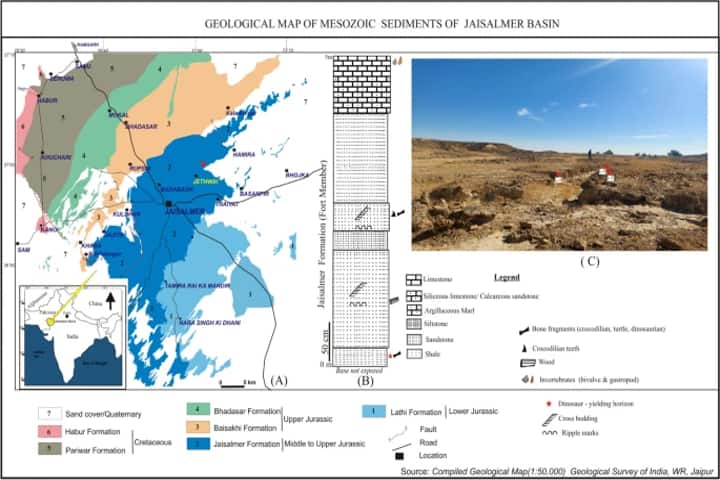

Geological map of Jaisalmer Basin showing the fossil locality; stratigraphic column showing the position of the dinosaur fossil yielding horizon; and photograph of the fossil site (Pic. Courtesy www. nature.com)
A major discovery in Rajasthan has been made by scientists of Indian Institute of Technology (Roorkee) and Geological Survey of India. In Jaisalmer, they found the oldest fossil remains of a plant-eating dicraeosaurid dinosaur which had a long neck and is 167 million years old.
The remains of this dinosaur were found and collected from a shale unit located at the base of the Middle Jurassic or early-middle Bathonian strata of Jaisalmer Basin and belongs to a new species which was not known to scientists so far.
The dicraeosaurid dinosaurs remains have been found in Africa, North and South America and Asia in China in the past but not in India. What makes this find significant is its age as it was found in rocks that date back to 167 million years, thus making this sauropod (creatures with very long necks and tails, small heads and four pillar-like legs that are thick) not just the oldest known dicraeosaurid but also the oldest diplodocoid – the broader group that covers dicraeosaurids and others.
This new species is part of a long line of dinosaurs which originated in India and then they rapidly dispersed across the rest of the world that was then called Pangaea. Before this discovery, the oldest sauropods came from China.
According to details of the study which was published in Scientific Reports, a journal by the publishers of Nature, the newly found dinosaur has been named Tharosaurus indicus with Tharo, referring to the Thar desert where the specimen was found, saurus derived from sauros, the Greek word meaning lizard and indicus specifying the name of the country of origin, that is India.
The authors of the study include Sunil Bajpai, Debajit Datta, and Triparna Ghosh, Department of Earth Sciences, IIT-R and Pragya Pandey, Krishna Kumar and Debasish Bhattacharya of GSI. The exploration and digging of the fossil was started by GSI in 2018 and it was collected by Kumar, Pandey and Ghosh under the supervision of Bhattacharya.
Emphasising the importance of this fossil, the authors in the study stated: “This discovery provides new insights into sauropod diversity of the Indian Gondwana, with important implications for the origin and dispersal of Neosauropoda.”
India decisively asserted its military superiority over Pakistan during this month's brief but intense conflict,…
Trade associations and local business groups in Pakistan-occupied Gilgit-Baltistan (PoGB) launched an indefinite protest on…
A human chain and protest march was organized by various organizations in front of the…
The United States on Saturday announced the expansion of its security partnerships with India through…
Highlighting the use of indigenous platforms during Operation Sindoor, Chief of Defence Staff (CDS) General…
Congress MP Shashi Tharoor on Friday (local time) said that Colombia will issue a statement…